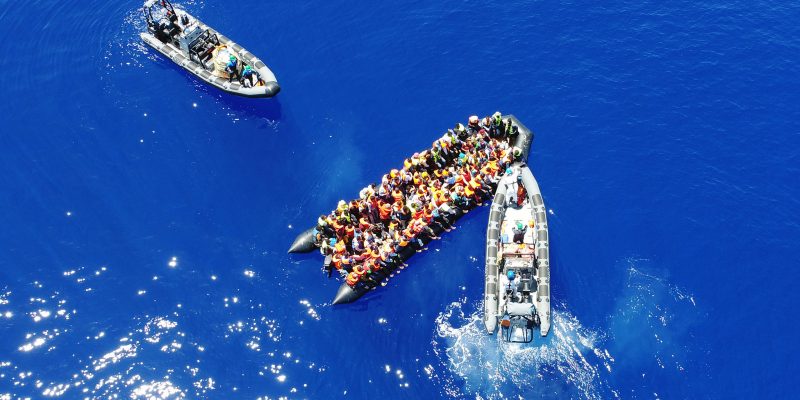1. Mediterranean sea, the ship that wants to stop migrants
Aim: to stop migrants and the NGOs who rescue them. This is the mission of the “Identitarian Generation,” a far-right group that took to the sea to “defend the Mediterranean and Europe.” How they mean to do it is not entirely clear: blocking rescue missions, as much as denying the shipwrecked migrants help, would be illegal (you can read why in our legal guide of Cild’s to solidarity at sea). Meanwhile, there was a lot of publicity around the temporary detention of the ship owner and the crew, accused of having irregular migrants from Sri Lanka on board. On this story, here are the summaries by Rossalyn Warren for The Washington Post and Claudia Torrisi for Valigia Blu.
2. Mediterranean sea, the code of conduct for the NGOs and the future of rescue missions
Meanwhile, in Rome, NGOs who operate rescue missions have been holding meetings with the Interior Minister Marco Minniti to discuss a “code of conduct” the government wants to implement (eleven items, including the obligation to grant judicial police access to their ships). Should the code be rejected, Italy could stop NGOs from accessing Italian harbors, though once again this could amount to an illegitimate act. Here you can read Lizzie Dearden for The Independent (along with our summary on which changes are underway in the Mediterranean).
Update: on Monday 31st of July, Doctors Without Borders (MSF) and the German NGO Jugend Rettet announced they won’t sign the ”code of conduct”. Save the Children and the Migrant Offshore Aid Station (MOAS) instead signed it. Ezster Zalan’s article on EU Observer.
3. Mediterranean sea, when rescue comes late
While the discussion is centered on the identitarian ship and the code of conduct for NGOs, people keep dying at sea. On board the Aquarius, one of the ships deployed in the rescue of migrants in the Central Med, Annalisa Camilli for Internazionale tells of the heartwrenching loss of broken lives at sea when rescuers don’t arrive on time.
4. Mediterranean sea, is there a real answer to the “migration crisis”?
In 2017 about 100,000 people arrived to Italy by sea, while over 2,300 lost their lives during the desperate crossing. Italians complain they can’t bear so many arrivals on their coasts, but in reality the situation has been unchanged for years. So a question arises: why has no one found appropriate answers so far? The BBC Radio 4 special feature discusses how to avoid deaths at sea, and thanks to Mattia Toaldo the focus is on Libya and the right strategy to try and curb migration flows stemming – and no, that is not cooperation with Libya. Accompany this read with the recent essay by Toaldo on border control (vs border closure).
5. Italy-France, the only way to cross is the “death pass”
Chronicles from the closed border between Italy and France. As we told you in the first of our reportages on border deaths, 12 people already died in a few months near Ventimiglia: drowned, run over, fallen, electrocuted, migrants lose their lives while attempting to cross the border. James Rippingale for Al Jazeera takes us to the “death pass,” the dangerous climb that is now the only way to continue the journey. And the situation seems about to worsen, as France is raising the number of roadblocks and armed guards on the border.
6. France, the new “jungle” in Calais
We might as well repeat it: evacuations do not solve humanitarian crises, the most they can do is move them a little further away. The perfect example is Calais where, despite the emphasis on the “final evacuation” a few months ago, migrants never really left. And the situation has worsened: according to the new Human Rights Watch report, denouncing heavy and systemic abuses on migrants, including minors, Calais is “hell on Earth.” Here is the article by Zosia Wasik on The Financial Times e here the op-ed on The New York Times (along with our very recent report from the Jungle).
7. Cities for refugees
How to integrate refugees in the urban communities that receive them? A new study focuses on the creation of social relations with people belonging to other nationalities and ethnicities. The article by Mimi Kirk for CityLab.
8. Soccer for refugees
Imagine you were born and raised in a camp for Rohingya refugees in Bangladesh, without ever knowing anything different than exile and extreme uncertainty – no hope to go back home, no prospects for the future. With the one consolation of running after a football on a muddy soccer field. Nathan A. Thompson for the New York Times tells the story of Mohammed Ismail, whom playing allows to forget, at least for a little while, the rage and sadness he’s known his whole life.
9. Gender issue: of refugee women and tampons
There is one need of refugee women that is rarely taken into consideration: sanitary products for the days of their menstrual cycle. But, despite the ridicolous, universal choice of using for these products the same taxation as “superflous goods,” tampons and sanitary towels are a primary necessity for all women, and even more when they are forced into a life of moving or in refugee camps. Laura Silver for Buzzfeed UK tells the story of a woman and her mission to grant sanitary products to refugee centers.
10. Dignity in exile
If you read one thing today, make it Ece Temelkuran’s op-ed on LitHub. A wonderful (and hard) reflection on the difficulty of finding dignity for those refugees and exiled that we keep seeing as victims and counting as numbers.
Translation by Marina Petrillo.
Header photo: Irish Defence Forces (CC BY 2.0).









